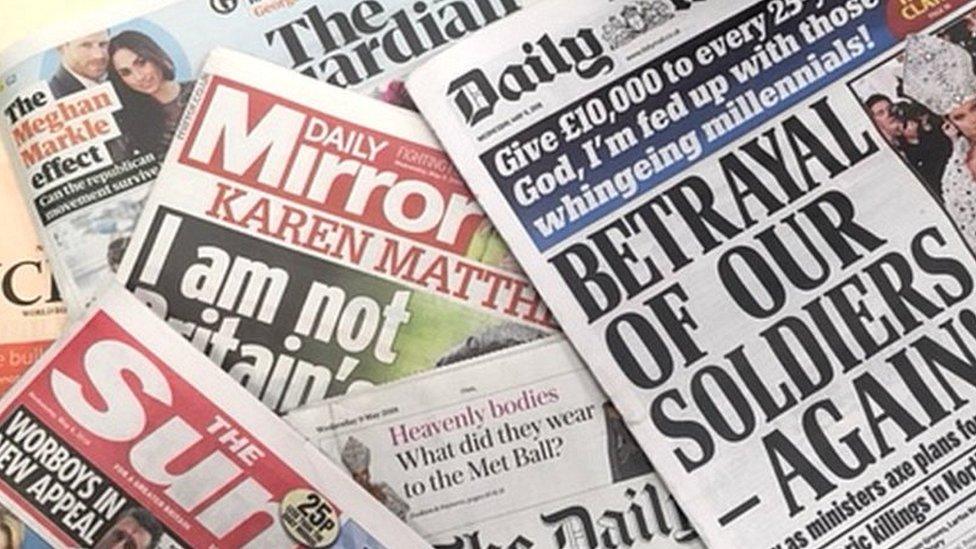Leveson: MPs vote for second time against re-opening press inquiry
- Published

MPs have, for a second time in a week, voted against re-opening the Leveson inquiry into press standards after ministers made further concessions.
Culture Secretary Matt Hancock said a review of newspapers' compliance with data protection rules would be widened in scope and would become permanent.
Labour said a "solemn" promise was made in 2011 for a two-part inquiry and new evidence of misconduct was emerging.
MPs overturned a Lords amendment backing phase two, by 301 votes to 289.
The government majority of 12 was slightly larger than in last week's vote, when ministers prevailed by nine votes.
Speaking before the vote, Mr Hancock said ministers had "gone out of their way" to listen to the concerns of MPs, peers and others campaigning on behalf of victims of press harassment.
Sir Brian Leveson was appointed by David Cameron in 2011 to chair an inquiry into the conduct of the press in the wake of phone hacking allegations against the News of the World.
The first part of the inquiry, in 2011-2012, examined press ethics, but the second part - with hearings into unlawful or improper conduct by newspapers and how the police investigated allegations were put on hold amid criminal inquiries over phone hacking.
The Conservative government has since said it will not implement this second part of the inquiry citing changes in the media landscape since then but peers voted on Tuesday to reinstate it by amending the Data Protection Bill.
Mr Hancock said MPs had "clearly and plainly" stated their opposition to re-opening Leveson and he hoped the further amendments to the bill he was putting forward would "strike a balance".
"We have gone out of our way to offer concessions at every stage to make sure the system of press regulation is both free and fair," he said.
Under his proposals, the Information Commissioner will launch a review of newspaper compliance with data protection rules within two months of the bill's approval, reporting to ministers within 18 months.
'Irregular'
The probe, he said, had been widened to examine whether the handling of data not just complies with the law but "good practice for the purposes of journalism".
The review will continue on a rolling basis over a five year period while there will be a separate report into the effectiveness of the newspaper's industry proposed dispute resolution procedures every three years.
Mr Hancock said he hoped this would allay public concerns and would be more effective and proportionate than continuing with a statutory inquiry.
Labour's Tom Watson said the government's concessions were "far-reaching and highly irregular" and appeared to give greater powers to ministers to interfere with the existing system of self-regulation.
He said victims of phone hacking and press harassment had been "solemnly promised" a two-part inquiry, which he said was necessary to consider fresh evidence of illegality and abusive and improper conduct by national newspapers.
Earlier on Tuesday, the Independent Press Standards Organisation said accounts of "troubling" conduct by journalists after the Manchester Arena bombing would amount to "grave breaches" of the editors' code if proven.